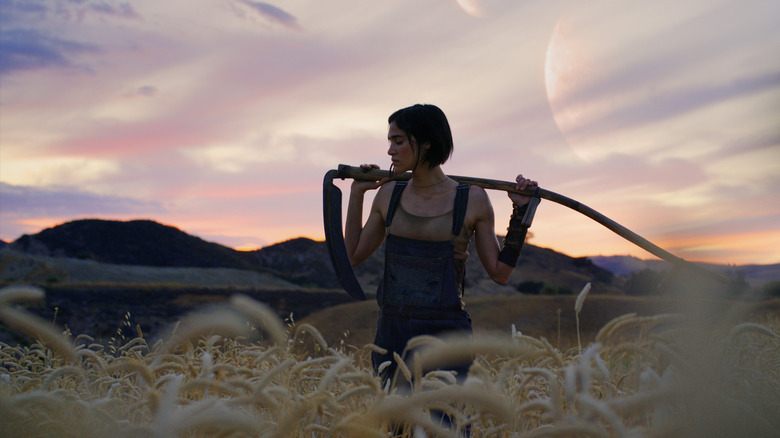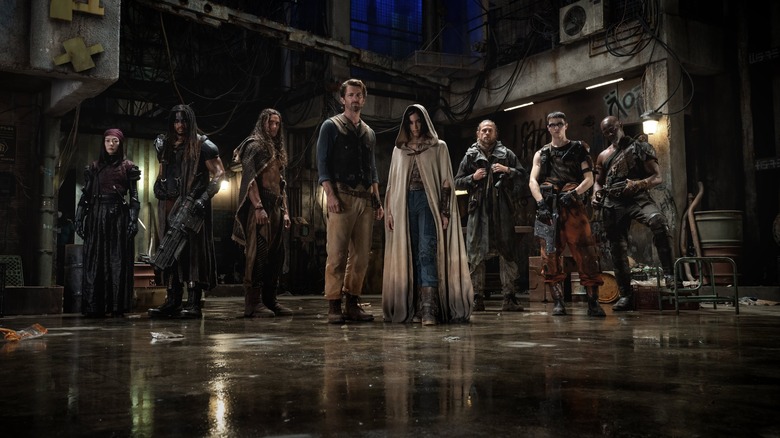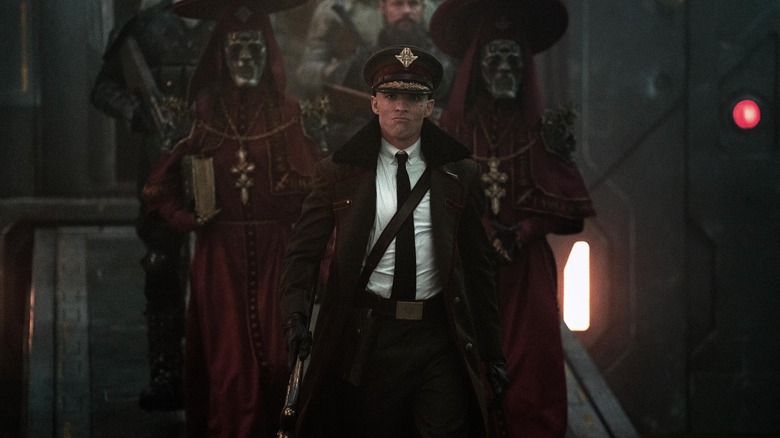Rebel Moon Review: Zack Snyder's Latest Is A Feature-Length Video Game Cutscene
As divisive as his films tend to be, many can agree that Zack Snyder's career has always been that of a trendsetter. When the filmmaker's distinct grasp of visual style and flair (developed while working in the music video scene early on) brought Hollywood knocking at his door, Snyder spent the next several years bringing various concepts to life that most considered "unfilmable." His groundbreaking adaptation of the graphic novel "300," which arguably redefined blockbuster action in pop culture throughout the early aughts, directly led to Snyder getting his hands on the holy grail of "Watchmen" in 2009. Although superhero movies moving forward would generally opt for the airy tone of Marvel's "Iron Man" rather than Snyder's grand and operatic take, the seeds were planted for the DC superhero world that would consume him for much of the next decade — and eventually lead to darker, more cynical, and self-reflexively critical comic book adaptations like "The Boys," "Invincible," and more down the line.
Which brings us to "Rebel Moon – Part One: A Child of Fire," a mouthful of a title that best encapsulates the ambitions — and flaws — at the heart of this new fantasy/sci-fi movie. Obviously meant to kickstart an entire franchise, the script written by Snyder, Shay Hatten, and Kurt Johnstad frontloads as much worldbuilding, dangling subplots, and reams of lore as it possibly can. And in the span of 2 hours and 14 minutes, it packs in everything from the adventurous spirit of "Star Wars" to the stunning vistas and creature designs of James Cameron's "Avatar" to the dense mythology of "Dune." But as the slow and drawn-out first act gives way to a tepid "Getting the gang together" middle portion and an explosive yet perfunctory climax, the space opera's main source of inspiration becomes abundantly clear.
More than the beat-for-beat parallels with "Seven Samurai" and "The Magnificent Seven" (or, for those of a certain age, "A Bug's Life"), "Rebel Moon" takes its cues from a much more surprising touchstone: video games.
As much as this might seem to align with the director's sensibilities and pioneering spirit, especially as a growing wave of video game adaptations are setting themselves up as the industry's next big thing, "Rebel Moon" and its reels of epic imagery all but collapses under the weight of such an uncinematic narrative approach. Between this and 2021's "Army of the Dead," it's undeniable that Snyder has emerged from his troubled DC experiences with a healthier perspective of the current studio system, a refreshing pivot towards making original movies instead, and (dare I say it) an infinitely better match between moviemaker and material. Through it all, however, the unfortunate fact remains that his storytelling instincts leave much to be desired.
A slow start and a meandering middle
For all its blockbuster gaudiness, "Rebel Moon" still displays a shocking amount of restraint in the early going. The film opens on a ponderous exposition dump by a narrating Anthony Hopkins, who voices an ancient robot named Jimmy (performed by Dustin Ceithamer on-set), but settles into a nice rhythm once we meet our main, if reluctant, hero. An outsider who settled on the desolate moon of Veldt two years prior to the events of the film, Kora (a steely and compelling Sofia Boutella) is content living in anonymity among a village of hedonistic, Viking-like settlers. All the typical hero's journey tropes are present and accounted for here, from the man harboring an innocent crush on her (Michiel Huisman's Gunnar, channeling an "Aw shucks" appeal to mostly convincing effect) to her mysterious backstory soon doled out in extensive flashbacks to the impending threat of the Imperium (known colloquially as the authoritarian "Motherworld") arriving on her doorstep.
As action-oriented as he may be, Snyder takes his time and allows these early moments to breathe. Perhaps a little too much, as it turns out.
The fly in the ointment comes from how talky and dialogue-heavy this table setting proves to be, which has never been a strength of most of his movies. Although this society's emphasis on a simple life and worldly pleasures helps ground this space opera in something tangible, no characters ever talk in anything resembling actual conversations. By the time Kora begins reciting her motivations and backstory out loud for the dozenth time ("I'm only telling you this so you know who I am," Kora literally says to Gunnar at one point after a prolonged flashback spelling out her origins), it's easy to imagine clunky, video-gamey dialogue wheels popping up on-screen to help dole out the bare minimum of pertinent information to us gamers viewers.
The issue only worsens when the plot kicks off in earnest, incited by Ed Skrein's vicious Admiral Noble and his Imperium warship appearing over Veldt alongside a small army of invaders and demanding a cut of the inhabitants' precious stores of grain. Kora's speed-ramped fight with some unruly soldiers (disappointingly, Snyder resorts to the threat of sexual assault as a motivation here) dashes any hopes of a peaceful resolution, leading her on a planet-hopping quest to put together a team of criminals, insurgents, and revolutionaries to help her small town repel their oppressors. The problem is, hardly any of these oddballs are given a good reason to join up in the first place. Kora and Gunnar repeatedly arrive in some gorgeously imagined new locale (including a blatant "Star Wars" cantina riff), encounter a new character just in time for them to undertake a random side-mission to prove their worth, and simply move on to the next recruit. This bizarrely episodic structure might as well be ripped straight out of countless video games, with NPCs milling around with no actual interiority ... right up until the moment the main character interacts with them and triggers the next level.
It's a shame, too, because the ensemble team consisting of Charlie Hunnam's roguish bounty hunter Kai, Bae Doona's honorable warrior Nemesis, Staz Nair's perpetually shirtless former slave Tarak, Djimon Hounsou's disgraced military general Titus, and Ray Fisher as rebel leader Bloodaxe, none of whom ever really develop or bond with one another in any meaningful way, deserved much better than this.
The compromises of streaming
And then there's the Netflix of it all. As much as streaming allows movies of this magnitude and inherent risk to exist in the first place these days, it's truly a disservice that most viewers will never be able to experience a story of such sweeping scale and unrestrained creativity — for all his narrative blind spots, Zack Snyder still has a masterful eye for composing and framing larger-than-life shots — on the big screen. The full effect of the thunderous sound design, Snyder's own cinematography, and Tom Holkenborg's (known as Junkie XL) propulsive, moody, and stirring score is impossible to recreate from one's laptop or living room TV. Of course, it's then fair to wonder whether the video-gamey nature of the story was done in part to satisfy the cravings of the streaming service's all-powerful algorithm; similar to how Snyder outright admitted he was told that movies over two hours long don't perform well, perhaps there's something about a series of fetch quests resembling video game cutscenes that's proven to hold the average Netflix subscriber's attention while they're playing on their phone.
Cynical? Probably, but little else would seem to explain the disconnect between the film's starry ambitions and its brutally complacent treatment of most of its own characters. Granted, we know that an extended director's cut is in the offing (one that should fix both the lack of character development and the distractingly bloodless violence of the theatrical version) ... but how often do gamers celebrate the rollout of patches and DLCs needed to fix the core problems of a new release?
Ultimately, "Rebel Moon" resembles little more than a grab-bag collection of world-building influences, mythology, and epic storytelling that we've seen done better many times before. As much as dye-in-the-wool fans will find plenty to geek out over, not even Snyder's usual tendency for bold storytelling choices or idiosyncratic themes will be able to move the needle much for casual viewers or controversy-seeking bystanders. It can sometimes be tricky when genre filmmakers finally get their chance to make a long-gestating passion project, running the gamut of James Cameron bringing the world of Pandora to life in his "Avatar" saga to Brad Bird's infamously misguided "Tomorrowland." "Rebel Moon" lands somewhere in the middle — neither catastrophic enough to go down in legend as a misfiring curio like "Jupiter Ascending" or "Valerian," begging to be reclaimed years from now, nor memorable or emotionally effective enough to merit as much pomp and circumstance as this soon-to-be franchise inevitably will.
By the end of "Rebel Moon," the closing title card of "End Part One" feels more like a threat than a promise.
/Film Rating: 4 out of 10


